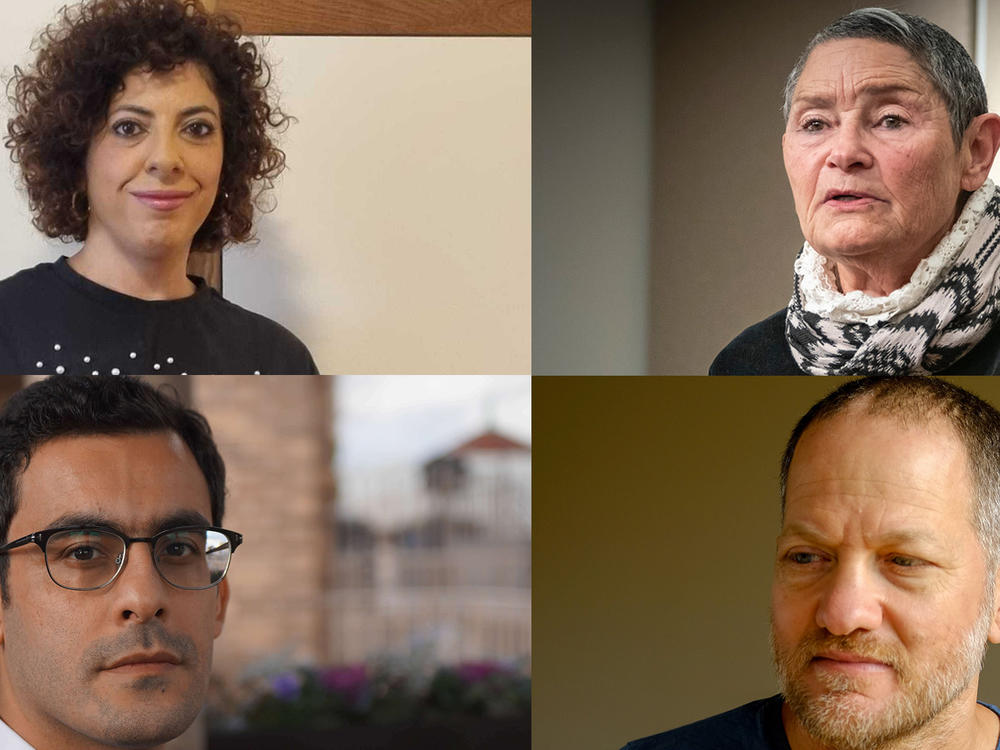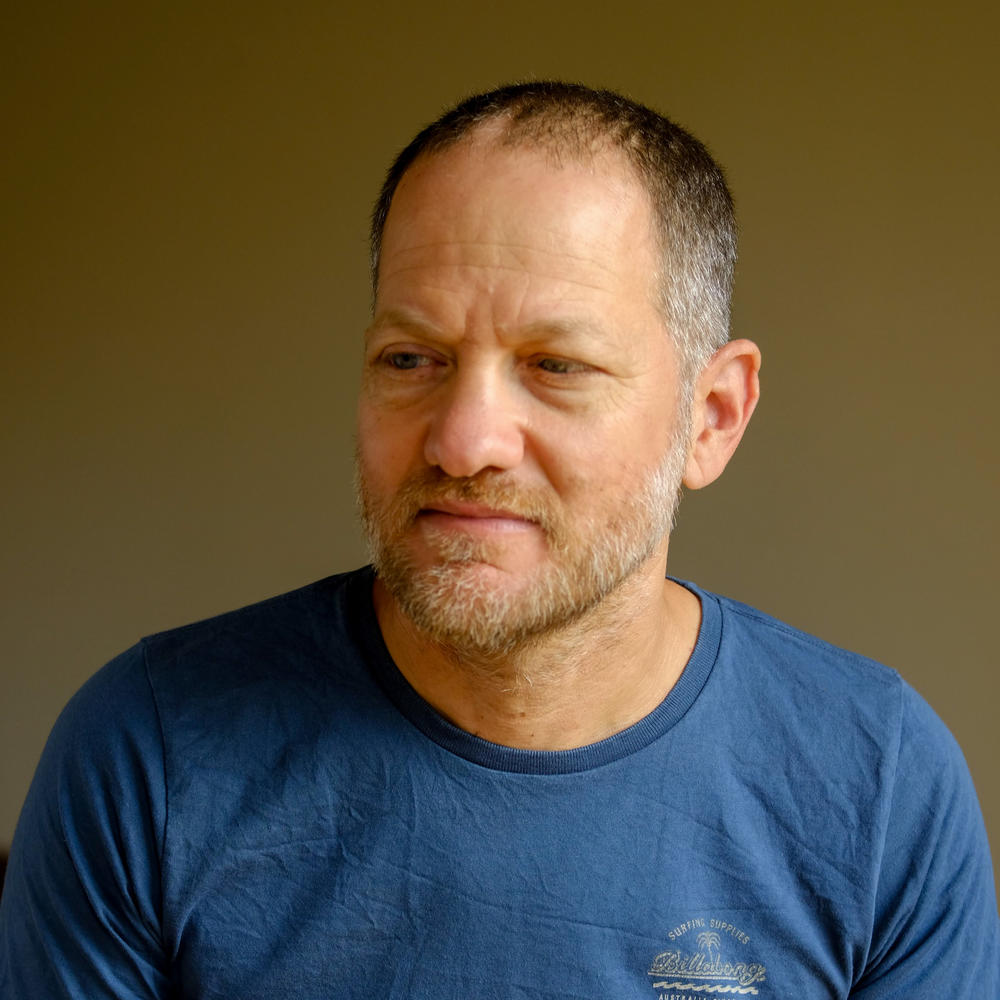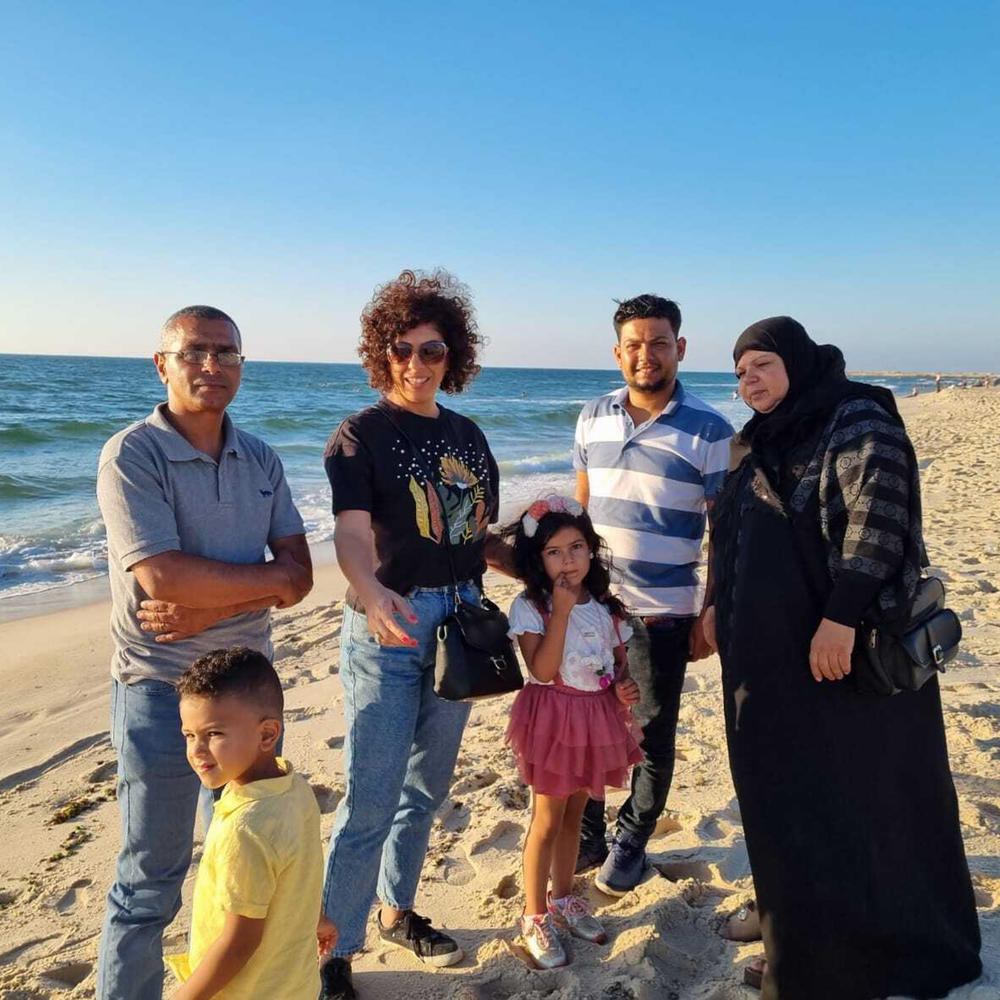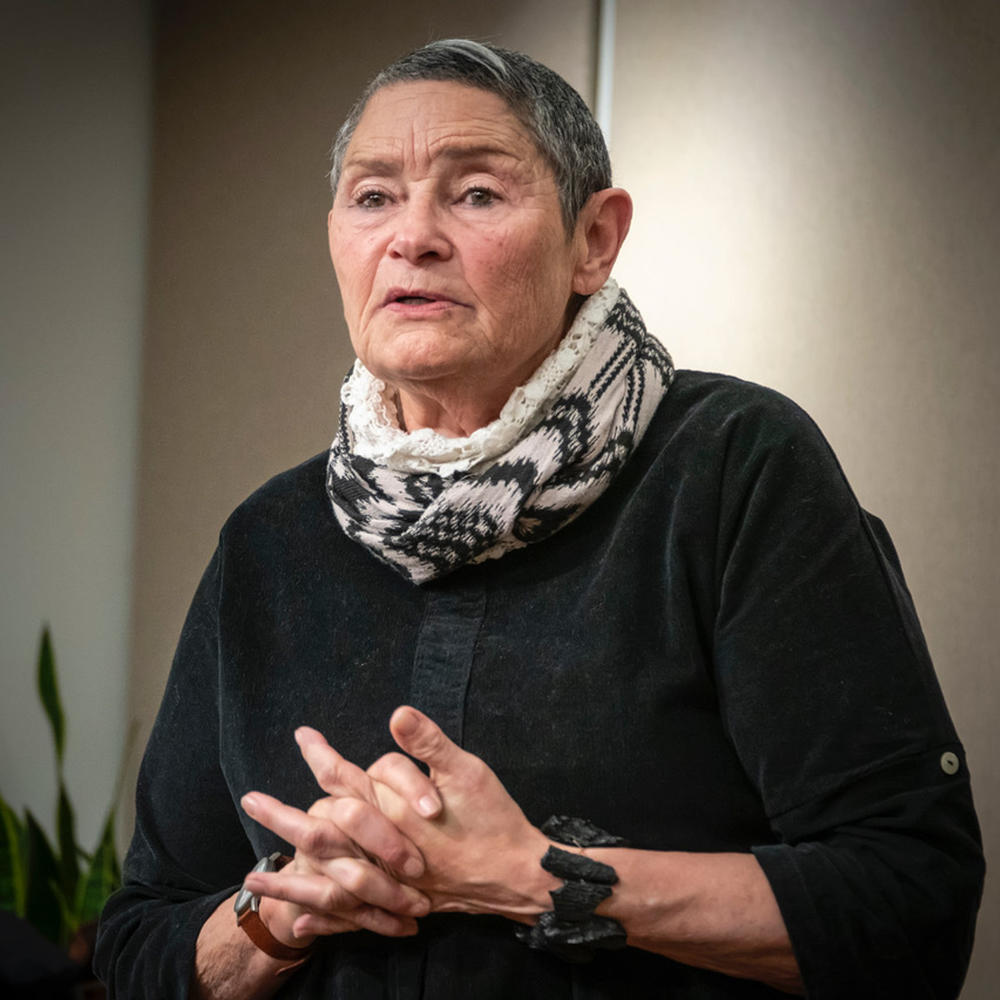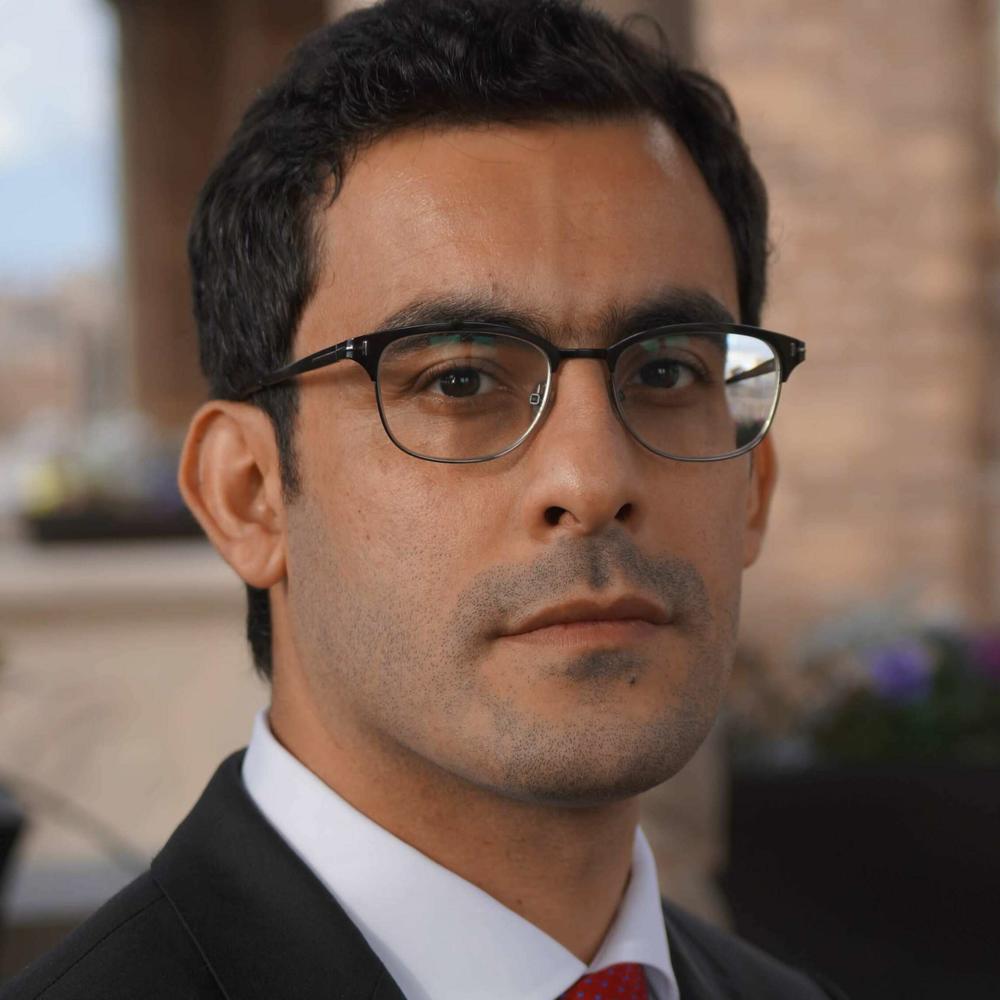Section Branding
Header Content
The Israel-Hamas war has not quashed their compassion, their empathy, their hope
Primary Content
Maoz Inon no longer sleeps well at night. His loss is too great.
So first thing every morning, for 45 minutes, he swims in the Mediterranean, off the Israeli shore — to find a few moments of peace.
"Great sea life — fish, manta rays," says Inon. "It's really surprising, beautiful swimming. Just to know that I'm doing something for my body and for my soul."
But once Inon is back ashore, the events of Oct. 7 come tumbling back into his mind.
The morning of the Hamas attack, Inon's parents were at home in their community of Netiv HaAsara, a mere quarter-mile from Gaza.
"I called, and my dad said he and Mom are in the safe room. And there are a lot of sirens and alarms and shooting," Inon recalls. When he saw the news about what was happening, he called his father back about five minutes later.
"And this time there was no answer," he says. "And this was the last time we heard from them."
Inon's father was 78 and an expert agronomist. His mother would have turned 76 this week. She was a retired schoolteacher and an artist. That morning, Inon says, a Hamas fighter launched a rocket-propelled grenade that directly hit his parents' wooden house.
"The security guy of the community told us that my parents' house is burned to ashes and there are two bodies inside," he says. Some of Inon's family in Israel gathered in person. They called his brother in London and their children. "[With] the group together, we told them," he says, his voice quivering.
For much of the time since then, Inon says it has felt like he's swimming in an ocean of sorrow.
"When you are swimming in the ocean," he explains, "you don't understand how big it is. You don't see the end, you don't see the bottom. So that's how big it is — more than you can understand."
And yet, amid this sea of grief that he's cratered into, Inon says he feels no urge for revenge. And when he cries, somehow the tears aren't for his parents.
"I was crying, and I'm still crying, for all the innocent victims from both sides that will die," he says. "And I'm crying for this 100 years of bloodshed, of cycle of death."
Inon says that this cycle can seem endless, but he has hope. "It seems like there is no solution," he says, "but there is."
Not everyone who has suffered a horrific loss responds like Inon.
Oded Adomi Leshem, a political psychologist at Hebrew University in Jerusalem, cautions that it's important to be realistic about people's potential for empathy when the trauma is still so fresh. "We need to be very sensitive [to] the current developments in the region," he says. "We are in the midst of the fighting. We're in the midst of war. People are going to funerals. People are burying their loved ones as we talk right now."
Even before the war began, Palestinians and Israeli Jews had mixed feelings about the future. A 2023 Pew Research Center survey found growing pessimism among both Israeli Jews and Palestinian citizens of Israel for a two-state solution (i.e., an independent Jewish state and an independent Palestinian state coexisting peacefully alongside one another). Just 35% thought it was possible, down from 44% in 2017 and 50% in 2013.
But in one of Leshem's research studies, he shows that Jewish Israelis and Palestinians consistently underestimate the other group's hope for peace. In addition, he says, "this underestimation actually reduces one's own hope."
Still, Leshem says his research has found that most people think and want the same thing. "Most Jewish Israelis and most Palestinians," he says, "want to live peacefully between the [Jordan] River and the [Mediterranean] Sea in some form of coexistence when there is safety for all the people."
In support of that argument, in an article in Foreign Affairs, two authors affiliated with Arab Barometer, a nonpartisan group that evaluates public opinion across the Arab world, point out that in a survey of Palestinians days before the war began, "73% of Gazans favored a peaceful settlement to the Israeli-Palestinian conflict." And two-thirds of those surveyed expressed little or no trust in Hamas.
Leshem also says that even a glimmer of hope can make a difference when things are at their bleakest.
"Think about a small flame of a candle," he suggests. "If the room is lit with daylight, then the light from this small candle doesn't really influence anything. But when the room is dark, then suddenly the light of the candle has some meaning."
The torn heart of a Palestinian citizen of Israel
In the aftermath of Hamas' early morning attack on Oct. 7 and Israel's subsequent military response, many communities in southern Israel were evacuated for their safety, including those that had been directly attacked. The group Physicians for Human Rights-Israel arranged to send its mobile clinic to help some of the evacuees staying at a hotel near the Dead Sea.
Dr. Lina Qasem Hassan had to make a difficult choice. She's an Arab citizen of Israel (i.e., a member of the country's Palestinian community) and she had to decide whether she wanted to join that mobile clinic.
"It's not easy as a Palestinian to do this," she says. "But I felt that it's my duty also to be with these people."
For her, the war has been a test of her compassion.
Most days, Qasem Hassan works as a family physician near Haifa in Israel, treating Jewish patients. "I have this human relationship with [my patients]," she says, "because I treated them for so many years. They respect the way I think and I respect the way they think. I can find inside myself this part that can really be empathic to the place they come from, the pain they represent."
For most of her life, she'd never even set foot in Gaza. Then, a few years ago, she began traveling to Gaza every other month with that same mobile clinic and a team of Arab citizens of Israel — volunteer doctors, surgeons and psychologists — to provide free health care to Palestinians.
"To visit Gaza," she says, "it's not easy because you see poverty and hunger. And even the medical problems of the children that we see there on other ordinary days — not on days of attacks — are actually anemia and failure to thrive, underweight children."
But she also saw families doing ordinary things — strolling the streets, buying ice cream for their kids.
On one of her first visits to Gaza, she met some of her extended family, including Marwan Abu Reda — her sister-in-law's brother. He was an ambulance driver living in southern Gaza. He hadn't seen his sister and mother, now living in Israel near Qasem Hassan, in decades.
It was summer, and so Abu Reda took Qasem Hassan to the beach. In a different universe, she says, it could have been a riviera.
"I could see the people, in regular days, how much the sea is important for them," she says. "If they didn't have the sea, they could die — really. Because they have no place to go. It's a very big prison, that was the feeling. And the only place that they can see a little bit far is the sea."
On the day of the attack, Qasem Hassan heard shouting outside her home in Israel. It was Abu Reda's sister and mother. They had just learned that he'd been driving his ambulance to rescue people when he was struck by incoming Israeli shelling.
"He died actually without seeing his mother," Qasem Hassan says. "It represents the story of the Palestinian people."
There's been no mobile clinic traveling from Israel to Gaza since the war began. In the wake of Israel's airstrikes and ground invasion, thousands of Palestinians have perished and the wounded have overfilled Gaza's beleaguered hospitals.
"I am the first one to call for the freedom of the Palestinian people and to end the occupation," Qasem Hassan says. "But I don't agree with what happened with the Hamas attack. My feeling was the pain of humans doesn't differ. It's not different if you are actually Israeli or Palestinian or American. It's the same pain."
This is what helped motivate her to accompany the mobile clinic to work with the Israeli Jewish evacuees. When Qasem Hassan walked into the hotel, she says it looked like a refugee camp. People were scattered everywhere. There were stacks of donated clothing. She talked to the evacuees who were from Kibbutz Be'eri, a community of 4,000 people not quite 3 miles from Gaza, and heard their horrific stories.
"They told me how they have been hiding for 20 hours," she recalls. "Old people without their medicine, without food, without water, all the family hiding in one room. They were very afraid, very worried about their own lives and the lives of their children." She met one old man with Parkinson's disease who, since the attack, could no longer walk.
As she listened and looked, Qasem Hassan kept seeing flickers in her imagination of the evacuees' Palestinian counterparts just a few miles away — displaced, injured, in shock. It was a kind of split vision.
Then, the secretary of the kibbutz began reading the long list of names of those from their community who'd died or been kidnapped.
"I was accompanied by a feeling, like, at least these people have names," she says, "and have somebody to put them in a list and give them clothes when their houses are destroyed. And I couldn't keep out of mind this thought that these people that are killed now in Gaza, nobody is even knowing their names. It's very difficult for me."
In the weeks since her time with the evacuees, Qasem Hassan says that each night when she learns about the latest devastation in Gaza, she cries. "I try to hide this from my daughters [who are 7 and 10] because I don't want them to see all these disasters going on. I'm very, very sad and I want to help but I can't help."
She's finding it harder and harder to sit on the sidelines. She wants to travel to Gaza to help the injured. "Every day I pray that somebody lets us get in. We are just praying that the borders will be open and we can go and help."
A terrible loss but no call for vengeance
Today's war between Israel and Hamas is stirring up painful memories for those who've suffered profound personal losses in previous cycles of this same conflict.
In early 2002, Robi Damelin recalls a sense of dread falling over her. It was during the Second Intifada, a massive uprising in the Palestinian territories of the West Bank and Gaza. Damelin's son David — who'd already served his mandatory time in the Israeli army — was called up for reserve duty in the West Bank.
At the time, David was a master's student at Tel Aviv University who enjoyed cooking with his mother and playing the French horn. "He was part of the peace movement," says Damelin, "and he didn't want to serve in the Occupied Territories." But he came to his mother and said that if he went, he would treat the Palestinians with dignity — something he could impress upon the soldiers he was commanding.
"I really didn't want him to go," says Damelin. But David went anyway.
On March 3, 2002, at a checkpoint, a Palestinian sniper killed David and nine others.
"When the army came to tell me that David had been killed by a Palestinian," Damelin recalls, "one of the first things that I said is: 'You can't kill anybody in the name of my child.' "
Damelin says she knew fairly quickly that she wanted to do something to prevent other mothers — both Palestinian and Israeli — from experiencing the pain she was now feeling. "I understood that that would be the rest of my life," she says. "My whole sense of priorities changed."
She joined the Parents Circle — Families Forum, a bereavement group for Israelis and Palestinians who've lost a close family member to the ongoing conflict. "I remember sitting around the table and looking into the eyes of the Palestinian mothers and recognizing that we shared the same pain."
Damelin started traveling with a Palestinian partner on behalf of the group and speaking about their shared grief. They spoke at the House of Lords in the U.K., the U.S. Senate and even a concert in San Francisco by Michael Franti, a rapper known for his social and political stands.
Then, 2 1/2 years after David's death, one evening while she was back home in Tel Aviv sitting in front of her computer, there was a knock. When Damelin saw three soldiers standing before her, she slammed the door because she didn't want to confront what she feared they were about to tell her. But they kept knocking. She finally opened the door again.
"And they said, 'We caught the man who killed David.' "
It was a test of her compassion. Did she mean what she'd been saying to all those people? "Now there's a face," she says.
It took her three months, but Damelin finally wrote a letter to the family of the sniper. "This for me is one of the most difficult letters I will ever have to write," it began. She told them about the Parents Circle and the need for some kind of reconciliation process. She told them about David.
"And I then told them that I thought we should meet because we owed that to our children and grandchildren," she says.
The sniper's family delivered Damelin's letter to the sniper in prison. It took three years before he sent her a reply. "And in it," Damelin says, "he told me that I'm crazy and that I should stay away from his family and that he killed 10 people to free Palestine."
But those words didn't sway her. "You see, I knew that when he was a very small child, he saw his uncle violently killed by the Israeli army," she explains. "And then in the Second Intifada, he lost two further uncles." She saw why he'd killed her son — out of revenge — and somehow, she forgave him.
Damelin grew up in South Africa during the anti-apartheid movement. Later, after David died, she returned to South Africa for a visit and met a woman whose daughter had been killed in the country's conflict. This woman had managed to forgive the people who'd killed her daughter.
"And then I met the man who actually sent the people who killed her daughter," she says. "And he said, 'By her forgiving me, she released me from the prison of my inhumanity.' "
Today, Damelin is director of international relations for the Parents Circle. She's helped organize dialogues between Palestinian and Israeli teenagers. "It's probably the first time that these kids ever had an opportunity to listen to a story of transformation," she says, "and to be able to ask the most difficult of questions." These questions include: Why do you teach your children to hate? What would you do if you met the soldier who killed your loved one? How do you see Hamas and other similar movements? What is Palestine?
Damelin has also helped run a summer camp for bereaved Palestinian and Israeli teens. One of her own grandchildren attended and told her, "This is the best week that I've ever spent in my life."
"This experience of being able to understand who's on the other side is quite extraordinary," she says. "When you begin to know somebody and they trust you, you can actually talk."
Damelin isn't sure how these programs and her efforts will fare in light of the current conflict. "There is no such thing as instant reconciliation," says Damelin. "We have to be very patient. This is still a war. Nobody knows where things are going."
Political psychologist Leshem agrees, and says that the timing of when to reach across this chasm of anguish is critical. "When the flames of war subside a little bit," he says, "then understanding what the other side thinks is very important."
But Damelin knows the damage for today's Israeli and Palestinian children and young people will be profound. "What kind of adults are going to come out of this?" she asks. "I'm terrified of all the retribution that's going to happen because people think that you can get revenge. There's no revenge. Revenge only creates more violence."
A bullet in his spine, hope in his heart
Yousef Bashir has a permanent physical reminder of the stakes of the long-running conflict between Israel and Gaza — a bullet lodged in his spine.
Bashir grew up in Gaza. In 2000, during the Second Intifada, when he was 11, Israeli soldiers occupied the second and third floors of his family home. As for why they did so, "the short answer is because they could," Bashir says. The house was isolated from the rest of the neighborhood and it gave the soldiers a lookout that let them "see all the way to the sea."
The soldiers "demolished our greenhouses," he says, "and pretty much every night, moved the entire family to sleep in the living room while they controlled the rest of the house."
Bashir says he had to ask the soldiers for permission to use the bathroom.
In the face of that difficult time, Bashir recalls his father explaining that "we should not allow them to turn us into hateful, vengeful people. I've watched my dad insist that the only way forward for both sides is peace. And it isn't only just because it is the right thing to do, but if we are to move forward and become doctors and engineers and husbands and fathers and productive members of the international community, we must do all we can to preserve our humanity."
His father drew on the Quran. "Never let hatred for any people lead you to deviate from being just to them," he quoted in Arabic.
Bashir says his father told him "it is one thing to lose one's home and one's land and even a loved one. But it is another thing — the most tragic thing — when one loses their humanity."
It wasn't always easy for Bashir to agree with his father. For instance, one summer, the soldiers prevented Bashir and his family from going to the beach, which was 15 minutes away. Bashir snapped. But his father said to him, "imagine you are at the beach, imagine the air, the breeze, the waves, the ocean, the sand, imagine, imagine what would you be doing?" Bashir couldn't quite put himself on the shore in his mind that day, but ever since he's practiced his ability to imagine. And it's helped him imagine a different reality for himself and his people to this day.
Peace and tolerance are the core lessons that Bashir was taught as a boy — "as a person, as a Muslim, as an Arab, as a Palestinian," he says. "I became peaceful in Gaza. I became peaceful when my house was besieged and when my family was shot at, when my farms were demolished. And I think that is a miracle."
Without those important lessons, Bashir isn't sure whether he would have survived his youth. "My dad saved my life," he says.
Roughly a week after he turned 15 years old, just outside his home, a soldier fired the bullet that embedded itself in the center of Bashir's back, in his spine. "I was lucky to survive," he says. "I collapsed to the ground. I was looking to figure out what was happening because I felt no pain. I saw no blood, but I could not speak and I definitely could not feel my legs."
"I think I was shot only because I was Palestinian," he reflects.
"Quite frankly," he admits, "I did want to die because it was not normal for a child to be subjected to that way of living. But at the same time, I'm just 15. Why should I go now?"
Bashir was rushed to a hospital in Tel HaShomer, Israel. Up until that point, he'd only met Israeli settlers and soldiers. But now he was meeting Israeli doctors trying to repair him.
"I don't think Israel intended to show me their human side," Bashir says. "But I think some higher power wanted me to see that." He recalls an Israeli nurse who frequently rushed to his side, explaining to some of the other health workers that he was shot for no justifiable reason. All this made Bashir understand his father's perspective better.
He also came to recognize that he's from a very particular part of the world. "I come from the Holy Land," he says. "The land of Jesus and Muhammad and Moses, the [land of the] Jews, Christians and Muslims."
Bashir was in a wheelchair for two years, but he did learn to walk again. He still does physical therapy and takes regular shots of cortisone to relieve the pain.
Today, half his lifetime later, 34-year-old Bashir lives in Washington, D.C.. where he's finishing his Ph.D. in international affairs at Johns Hopkins University. The residual bullet causes him ongoing discomfort — "a 24/7 ordeal for me," he says. "When I watch movies, when I hang out, when I sleep, when I play, when I do just about anything."
To Bashir, it's a constant reminder of the conflict — and why the fighting must stop.
"I am here," he says. "I still believe. I'm still committed. Despite the pain that I will experience tomorrow, I am convinced that [peace is] the only way forward."
The present moment, however, is a difficult test of Bashir's conviction.
"With every image, with every video, with every report I see of innocent Palestinians being killed and targeted," he says, "I get very close to screaming in my apartment. And breaking." Bashir's voice cracks.
And then he remembers his father who insisted on peace.
"It's bad enough," says Bashir. "My people lack freedom and a state and so much more. I think to be deprived of [our humanity] is just unacceptable. And so in preserving my humanity, in my mind, I am somehow still giving my people and the world a chance for a better life."
The right to live in peace and security, Bashir argues, "belongs to the Palestinians just as much as it belongs to the Israelis."
An ocean of grief, a vision of peace
Maoz Inon — who swims every morning to keep from drowning in grief — says he's experienced this other reality of peace. He and his wife opened a guesthouse in Nazareth in 2005 that serves both Israeli Jews and Palestinians. And he's seen these two groups "not living next to each other but living among each other based on equality" in what Inon calls a shared society.
"I have partners and friends in the Palestine territories, in Jordan, in Egypt," he says. "And I know that they are also sharing with me the thoughts that peace is achievable."
It's a peace, he says, that must start with an immediate cease-fire.
And unlike conflict, which political psychologist Leshem says is bloody but familiar to Israelis and Palestinians, hope is different. It's unfamiliar and unpredictable. "If we kind of accept this unpredictability," he says, "take the chance [on] this uncertain thing — which is called peace between the [Jordan] River and the [Mediterranean] Sea — then this is closely related to hope."
Inon says he had something of a vision after this war began. It was the middle of the night, and he awoke in tears.
"And I saw an image of everyone crying," he recalls. "Just we all cry — you cry, your daughter cry, everyone. And our tears are healing the wounds from Israelis and Palestinians. And our tears wash the blood."
He says we shouldn't have more weapons, build higher walls and create better security systems. "That's the old world, OK? You want to start a new world? We need to cry."
"And then," he says, "we'll see the path for peace."
Copyright 2023 NPR. To see more, visit https://www.npr.org.
